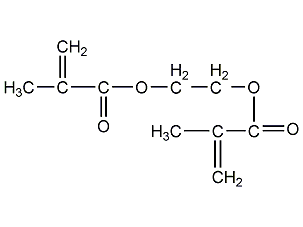
Structural formula
| Business number | 02CW |
|---|---|
| Molecular formula | C10H14O4 |
| Molecular weight | 198.22 |
| label |
2-Methyl-2-propenoic acid-1,2-ethylene glycol ester, Ethylene glycol methacrylate, Ethylene glycol di(methacrylate), Ethylene glycol di(methacrylate), Ethylene Glycol HEMA-Methacrylate, Ethylene glycol dimethacrylic acid, 2-methyl-2-acid 1,2-ethylene glycol ester, methacrylic acid ethylene glycol ester, glycol bis (methyl methacrylate) ester, 2 (methyl acrylic acid) glycol ester, Glycol HEMA-methacrylic acid ester, ethylene glycol dimethacrylate, Esters |
Numbering system
CAS number:97-90-5
MDL number:MFCD00008590
EINECS number:202-617-2
RTECS number:OZ4400000
BRN number:1776663
PubChem number:24845598
Physical property data
1. Properties: colorless liquid.
2. Density (g/mL, 25℃): 1.054
3. Relative vapor density (g/mL, air=1): Undetermined
4. Melting point (ºC): -20
5. Boiling point (ºC, normal pressure): 97
6. Boiling point (ºC, kPa): Undetermined
7. Refractive index: 1.4522
8. Flash point (ºC): >110
9. Specific rotation (º): Undetermined
10. Autoignition point or ignition temperature (ºC): Undetermined
11. Vapor pressure (mmHg, 21.1ºC): <0.1
12. Saturated vapor pressure (kPa, 20ºC): Undetermined
13. Heat of combustion (KJ/mol): Undetermined
14. Critical temperature (ºC): Undetermined
15. Critical pressure (KPa): Undetermined
16. Log value of oil-water (octanol/water) partition coefficient: Undetermined
17. Explosion upper limit (%, V/V) : Undetermined
18. Lower explosion limit (%, V/V): Undetermined
19. Solubility: Insoluble in water, soluble in some organic solvents.
Toxicological data
1. Acute toxicity: Rat oral LD50: 3300mg/kg; Rat peritoneal cavity LD50: 2800mg/kg;Mouse oral LD50: 2 mg/kg; 2. Mutagenicity: mutation experiment in mammalian somatic cells: mouse lymphocytes, 5820 μmol/L;
Ecological data
This substance may be harmful to the environment and it is recommended not to let it enter the environment.
Molecular structure data
1. Molar refractive index: 51.06
2. Molar volume (cm3/mol): 190.3
3. Isotonic specific volume (90.2K): 449.8
4. Surface tension (dyne/cm): 31.1
5. Dielectric constant:
6. Dipole moment (10-24 cm3):
7. Polarizability: 20.24
Compute chemical data
1. Hydrophobic parameter calculation reference value (XlogP): 1.9
2. Number of hydrogen bond donors: 0
3. Number of hydrogen bond acceptors: 4
4. Number of rotatable chemical bonds: 7
5. Number of tautomers:
6. Topological molecular polar surface area (TPSA): 52.6
7. Number of heavy atoms: 14
8. Surface charge: 0
9. Complexity: 237
10. Number of isotope atoms: 0
11. Determine the number of atomic stereocenters: 0
12. Uncertain number of atomic stereocenters: 0
13. Determine the number of chemical bond stereocenters Number: 0
14. Number of uncertain chemical bond stereocenters: 0
15. Number of covalent bond units: 1
Properties and stability
Avoid light. Avoid contact with strong oxidants, strong alkalis, and strong acids. Slightly soluble in water.
Flammable and easy to polymerize
Storage method
Store in a cool, ventilated warehouse. Keep away from fire and heat sources. Protect from direct sunlight. The storage temperature should not exceed 30℃. Keep container sealed and strictly prohibited from contact with air. They should be stored separately from oxidants, acids, and alkalis, and avoid mixed storage. It should not be stored for a long time to avoid deterioration. Equipped with the appropriate variety and quantity of fire equipment. The storage area should be equipped with emergency release equipment and suitable containment materials.
Synthesis method
Direct esterification of ethylene glycol and methacrylic acid under the catalysis of sulfuric acid, and the crude product obtained is a finished product after distillation under reduced pressure. Process flow: In a four-neck bottle equipped with an electric stirrer, thermometer, air duct, water separator and reflux condenser, add 0.345 mol of methacrylic acid and 0.15 mol of ethylene glycol, 3 g of catalyst p-toluenesulfonic acid, 0.08 g hydroquinone and an appropriate amount of solvent, and continue to add solvent to control the reaction temperature below 85°C. The amount of air introduced is 2 ml/min, and the mixture is continuously stirred and refluxed for 7 hours. After cooling, add 10 ml of water, stir for 10 minutes, transfer the material to a separatory funnel, separate the aqueous layer, wash the organic layer with 10% NaOH solution and then wash until neutral, separate the aqueous layer. The low-boiling solvent was evaporated under reduced pressure under the inhibition of p-methoxyphenol and weighed. The calculated yield was about 93.3%. 
Purpose
Used in organic synthesis.
Used as a cross-linking agent for synthetic resins, resin processing and manufacturing of adhesives, coatings, etc. It can also be used as rubber resin modifier, anaerobic adhesive, plastic paste, etc.
extended-reading:https://www.newtopchem.com/archives/44315extended-reading:https://www.bdmaee.net/butyltin-mercaptide-2/extended-reading:https://www.bdmaee.net/wp-content/uploads/2022/08/NEWTOP8.jpgextended-reading:https://www.bdmaee.net/dabco-pt303-tertiary-amine-catalyst-dabco-pt303-catalyst-dabco-pt303/extended-reading:https://www.bdmaee.net/wp-content/uploads/2022/08/37-2.jpgextended-reading:https://www.newtopchem.com/archives/1148extended-reading:https://www.bdmaee.net/toyocat-dmi-gel-catalyst-tosoh/extended-reading:https://www.bdmaee.net/4-acetyl-morpholine/extended-reading:https://www.newtopchem.com/archives/39772extended-reading:https://www.bdmaee.net/nt-cat-9726/


Comments